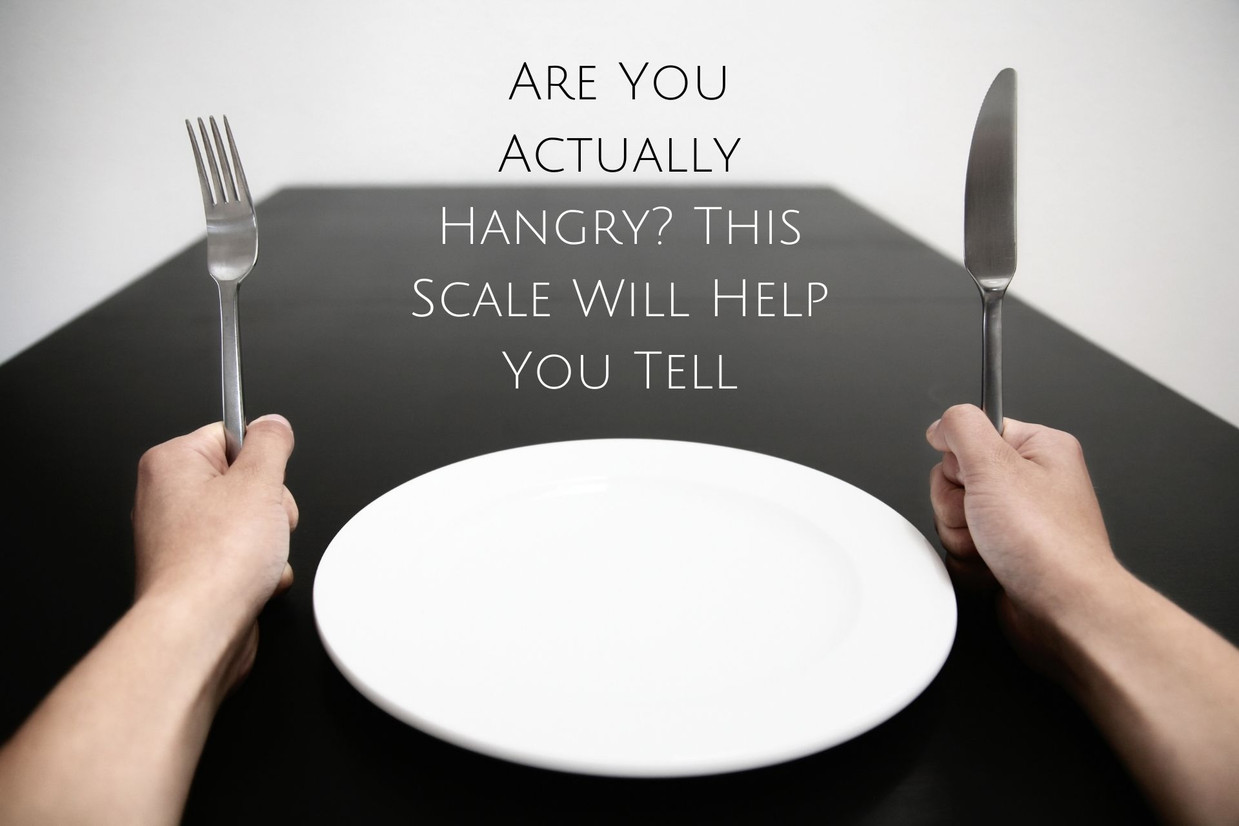Are You Actually Hangry? This Scale Will Help You Tell
These tips can help you determine if you're hungry. This Scale Can Help You Tell If You Are Hungry
Your stomach starts to growl when you get so busy with work, chores, or errands that time passes quickly. You've been hungry for hours and haven't had lunch in hours.
Perhaps you feel like you are bursting at the mouth and cannot eat another bite. But it is impossible to stop eating because you love your meal so much that you won't give up. When should you stop eating?
Many of us lose touch with our bodies' hunger and fullness cues due to all the demands and pleasures of life. It is essential to maintain a regular eating pattern for many reasons. These include helping digestion, maintaining high energy levels, and getting enough rest. You can learn your body's hunger signals and fullness to ensure you get the nutrition you need to be your best. The hunger-fullness scale, also known as the hunger-fullness system, makes it easy to track.
How to tell if you're hangry?

Your emotions can influence your relationship with food, leading to your eating even if you're not hungry. These tips can help you determine if you're hungry.
●Try Drinking a Glass of Water

Although this trick might seem absurd, sometimes it is difficult to tell the difference between hunger and thirst. It is possible that they might not be hungry but just dehydrated. Take a glass of water, and wait 10 minutes to see if your hunger disappears.
●Wait for a Few Minutes

Waiting for a few moments can help you determine if you are hungry. You should eat if your hunger persists after waiting for 10 to 15 minutes.
●Try to work out What result in the sensation of Feeling Hunger

You may be wondering why you are feeling hungry. Does one feel sad, depressed, or bored? You will to try and work eliminate these triggers once you get to understand them.
●Find Out If Your Meals Are Nutritious Enough

You may feel hungry even though you have eaten recently. This could be because your meals aren't enough. You may feel hungry sooner than expected if your meals don't have enough protein. This is why it's important to plan balanced meals and stick to them.
The hunger-fullness index is from 1 to 10.

The hunger-fullness and diet-culture scales are becoming increasingly popular alternatives to diet culture. The hunger-fullness or hunger-satiety is also known. It can be used to determine when you are hungry, just eating for food, and when you need to eat more. You can use it to help you decide when to put your fork down, so you feel satisfied and not sick.
The hunger scale measures your hunger levels from 1-10. Score 1 is painfully, ravenously hungry, whereas 10 is beyond full, feeling sick. A score of 5 is neutral. This scale can help people identify their hunger and fullness cues. It may sound simple, but it is something that many clients struggle with.
This Scale Will Help You Tell
10: You're beyond full. You feel sick and nauseous because you are too full.
9: Stuffed. You're full and may feel stomach pain and discomfort.
8: You feel full, or a little more than you need.
7: Moderately satisfied. You feel satisfied and comfortably satisfied.
6: Feeling light-full. You feel satisfied but could eat more (and likely will be hungry again in a few hours).
5: Neutral. You don't feel full or hungry.
4: You feel light hungry. Hunger sets in. You may feel your stomach growl and have an appetite.
3: Moderately hungry. You feel more hungry and start to feel irritable, uncomfortable, or distracted.
2: Very hungry. You may feel weak and low-energy. You may feel nauseous or ill.
1: Starving. You are very hungry and weak. It is possible to feel dizziness, headaches, inability, or fatigue. There are many variations to this scale. Some include a 0 for extreme hunger. The concept behind the scale remains the same: it measures the fullness and hunger spectrum.
Make healthy choices

You must take balanced meals to satisfy your body. Each meal should include:
●Carbohydrate. This can be obtained from fruits and vegetables, as well as grains.
●Protein. This can be obtained from meat, fish and eggs, dairy products, yogurt, cheese, dried beans, and nuts.
●Fat. The fats that are good for your health include:
●Flaxseed oil, walnuts, and fish are all good options. These foods contain omega-3 fatty acids.
●Canola, peanut, and olive oils; most nuts; avocados and olives. These oils have monounsaturated fats.
●Oils from cottonseed, sunflower, sesame, and corn. These oils contain polyunsaturated fats.
You should enjoy the tastes you love and desire in your meals. This will help you feel satisfied.
When to Stop Eating

Stop eating when you feel full. Feeling too full can make you uncomfortable, which ultimately means eating too many calories.
Find out what it feels like to be "satisfied" or "pleasantly satisfied."
●Before you start eating, relax and then eat slowly. It takes time for your stomach and brain to signal that you are full.
●Check your hunger levels after eating a quarter of your meal. Continue eating if you feel hungry. If not, stop at the halfway mark. No matter what your parents taught you, you don't need to clean up your plate.
Can I eat even if I'm not hungry?

Eating for other reasons than physiological hunger can be encouraged. It's not like people eat birthday cakes because they are truly hungry. Although most of our food decisions are based upon physical hunger cues (for the most part), there are situations where eating without hunger is a healthy and necessary option.
Imagine that you are attending a conference for a whole day, and your next meal will not likely be until the end of the day. To fuel your afternoon, you may need to eat a larger breakfast earlier than usual. You may not feel hungry while eating, but you are using your nutrition intuition and supplying enough food for the long day.
A birthday cake is a great example of joy eating.
Lesser-Known Hunger Signs

●You are Bloated

Bloating is often associated with excess eating, but it is possible to feel bloated if you eat too much. Gas buildup can be caused by going too long without eating. Constipation can occur if you drink inconsistently or don't eat enough fiber. Making things more difficult, being bloated or constipated can reduce our appetite. The cycle continues. Regular eating, regular exercise, and adequate fluid intake can all help to combat constipation.
●Food is your priority.

One of the main features of restrictive eating disorders such as anorexia is a strong preoccupation with food. Even if your eating disorder is not severe, the constant thought of food could indicate that your body doesn't get enough calories. This is a defense mechanism. Our brains want to ensure that we have enough energy to function at our best. If you notice an increase in food thoughts, it may be a sign that your body is trying to tell you that you are restricting calories or not eating enough.
●Irritable

You may feel hungry if you are feeling irritable. Sometimes, we feel irritable before hunger pangs hit. Low blood sugar levels can lead to hunger. This makes it more difficult to control negative emotions like anger and irritability. Another theory states that our brains learn to associate hunger with negative emotions. So we perceive the feeling of hunger negatively when we feel it.
When we are feeling hungry, mindful eating is more common than usual. Drops in blood glucose levels can increase our chances of overeating. We tend to eat more when we are feeling hungry. You can avoid feeling hungrier by focusing on healthy meals and the timing of meals. This is one of our best methods to manage our blood sugar levels and, in turn, our mood.
●Your Focus Is Off

Glucose, the brain's preferred fuel source, is why it can be difficult to focus if we eat too few starches. Our bodies require food to get to the next destination, just as a car needs gasoline. All calories are not created equal. Some foods can support steady focus better than others. High-sugar, high-fat foods can lead to major energy spikes that then quickly drop, leaving you feeling exhausted. Balanced meals with protein, fat and high fibre carbohydrates will help you focus better and be more productive.
Conclusion
Many people are sensitive to their eating habits because of diet culture's constant pressure to lose weight. This pressure can cause feelings of fullness or hunger to feel uncomfortable. Feeling full might make you feel guilty instead of satisfied. You might be able to skip meals or ignore your hunger with some diets.
Recent Posts
-
Exploring the Evolutionary Role of Bacteria-Fungi Symbiosis in Cell Development
The intricate relationships between microorganisms have long fascinated scientists. Among these, the
-
From Stress to Serenity: Real-Life Success Stories of Adaptogen Use
While lifestyle changes like exercise, meditation, and a healthy diet are essential for managing str
-
The Long-Term Effects of Chemical Exposure on Human Health
The Long-Term Effects of Chemical Exposure on Human Health Chemical exposure is an inevitable part o





